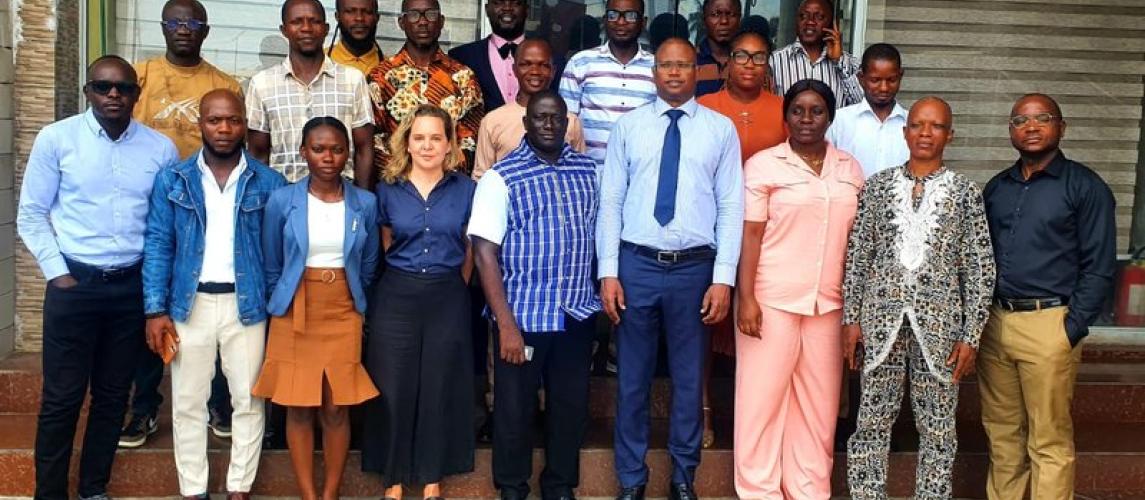
Liberia Meteorological and Hydrological Services, with WMO, Launch Landmark Digital Transformation Training to Strengthen Climate Resilience
MONROVIA, Liberia -- The Liberia Meteorological and Hydrological Services (LMHS), in partnership with the World Meteorological Organization (WMO), successfully convened a five-day digital transformation training workshop from November 17 - 21, 2025, in Monrovia, Liberia.
This landmark initiative brought together 23 participants representing key national institutions, including the Liberia Meteorological Service (LMS), the Liberia Hydrological Service (LHS), the Liberia Civil Aviation Authority (LCA), the Liberia Airport Authority (LAA), CARI, and Liberia Land and Energy.
The workshop underscored LMHS’s commitment to strengthening national capacity in climate and hydrological services through digital innovation, modernized data systems, and enhanced early warning dissemination.
Albert Momolu. Sherman, Director of Liberia Meteorological Service at the Ministry of Transport, formally opened the workshop, commending WMO experts for sustained technical support and dedication to advancing Liberia’s meteorological and hydrological services. He urged participants to approach the training with seriousness and focus, emphasizing that digital transformation is central to building resilient institutions and safeguarding communities against climate risks.
The technical sessions were designed to build competencies across the entire digital value chain of climate services. Participants engaged in hands-on exercises and system configuration activities, covering WIS2/WIGOS, strengthening integration into the Global Observing System, OSCAR/Surface Enhancing metadata management for observation stations, and WIS2box and WIS2 Node Configurations, facilitating seamless data exchange and interoperability. Other include ADL Operations Supporting automated data workflows, Common Alerting Protocol (CAP) Producing and disseminating standardized early warnings, ClimWeb Website Management Improving institutional visibility and public access to climate information, Map Viewer Tools visualizing hydro meteorological data for decision-making, and Digital Outreach Strategies expanding communication channels to reach diverse stakeholders.
This comprehensive training equipped participants with practical skills to modernize institutional digital platforms, strengthen data sharing and interoperability with regional and global forecasting centers, enhance early warning dissemination to communities and decision-makers, and improve public trust and visibility of national meteorological and hydrological services
The WMO experts emphasized the global significance of digital transformation in meteorological services. They highlighted that improved data sharing, particularly through WIS2box integration, will enable regional and global forecasting centers to deliver more reliable and timely weather and climate information tailored to Liberia’s needs.
This advancement positions LMHS as a proactive contributor to the Early Warnings for All (EW4ALL) initiative, ensuring that Liberia is better prepared to mitigate climate-related risks and safeguard lives, livelihoods, and infrastructure.
On behalf of the participants, Director Sherman commended WMO experts for their unwavering commitment to capacity development in Liberia. He emphasized that the skills gained will significantly improve service delivery within LMHS and its partner agencies.
In addition to this, Director Sherman has appointed Freeman Blackie, ICT/Agro-Meteorology Technician at the Central Agricultural Research Institute, as the focal Point for the Agro-Met Bulletin in Liberia.
Mr. Abubakar Salih Babiker pledged to submit recommendations to WMO and the EW4ALL initiative, particularly addressing challenges faced by LMS. He encouraged participants to apply the knowledge gained to strengthen institutional resilience and advance national climate services.
The Digital Transformation Training Workshop marked a critical milestone in Liberia’s journey toward modernized meteorological and hydrological services. By equipping national experts with advanced digital competencies, LMHS, supported by WMO, has taken a decisive step toward building a future-ready climate service system that is responsive, reliable, and resilient.
The commitment expressed by participants and leadership alike signals a clear path forward: leveraging digital transformation to protect lives, empower communities, and strengthen Liberia’s role in the global climate services ecosystem.
